but和than引导的定语从句
- 格式:doc
- 大小:27.50 KB
- 文档页数:2
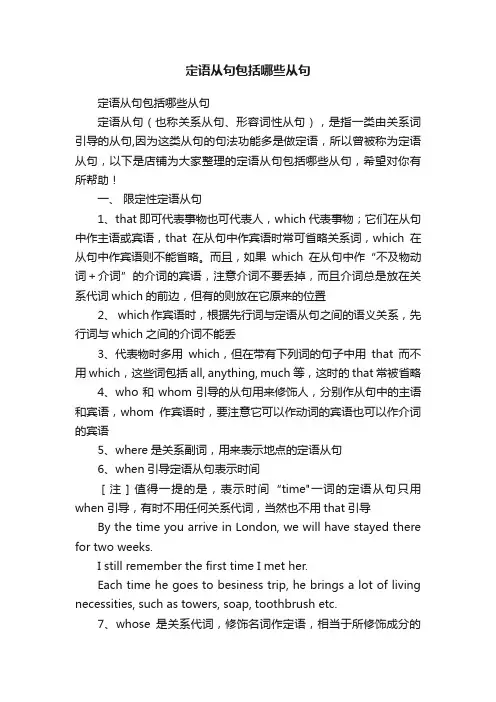
定语从句包括哪些从句定语从句包括哪些从句定语从句(也称关系从句、形容词性从句),是指一类由关系词引导的从句,因为这类从句的句法功能多是做定语,所以曾被称为定语从句,以下是店铺为大家整理的定语从句包括哪些从句,希望对你有所帮助!一、限定性定语从句1、that即可代表事物也可代表人,which代表事物;它们在从句中作主语或宾语,that在从句中作宾语时常可省略关系词,which在从句中作宾语则不能省略。
而且,如果which在从句中作“不及物动词+介词”的介词的宾语,注意介词不要丢掉,而且介词总是放在关系代词which的前边,但有的则放在它原来的位置2、 which作宾语时,根据先行词与定语从句之间的语义关系,先行词与which之间的介词不能丢3、代表物时多用which,但在带有下列词的句子中用that而不用which,这些词包括all, anything, much等,这时的that常被省略4、who和whom引导的从句用来修饰人,分别作从句中的主语和宾语,whom作宾语时,要注意它可以作动词的宾语也可以作介词的宾语5、where是关系副词,用来表示地点的定语从句6、when引导定语从句表示时间[注]值得一提的是,表示时间“time"一词的定语从句只用when引导,有时不用任何关系代词,当然也不用that引导By the time you arrive in London, we will have stayed there for two weeks.I still remember the first time I met her.Each time he goes to besiness trip, he brings a lot of living necessities, such as towers, soap, toothbrush etc.7、whose是关系代词,修饰名词作定语,相当于所修饰成分的前置所有格8、当从句的逻辑主语是some, any, no, somebody, anybody, nobody, something, anything, everything或nothing时,常用there is来引导二、非限定性定语从句:非限定性定语从句的作用是对所修饰的成分作进一步说明,通常和主句间用逗号隔开,将从句拿掉后其他部分仍可成立1、which引导的.非限定性定语从句来说明前面整个句子的情况或主句的某一部分2、在引导限定性定语从句时,that有时相当于in which, at which, for which或at whichAttitudes towards daydreaming are changing in much the same way that(in which) attitudes towards night dreaming have changed. 人们对白日做梦的态度正在改变,这与人们对夜间做梦的看法的变化有非常相似之处。
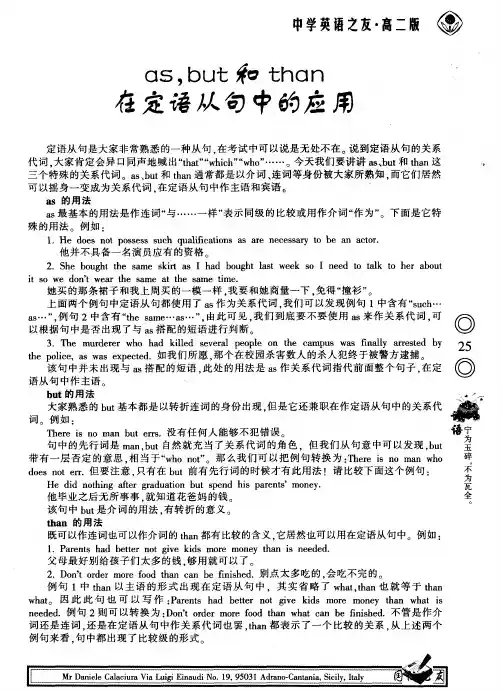
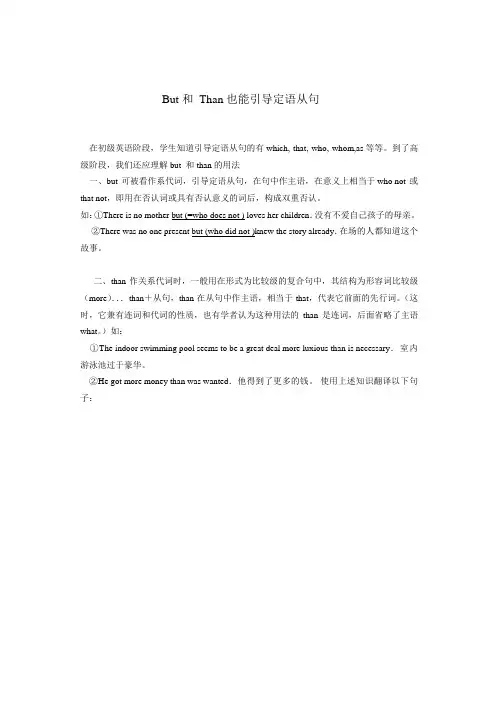
But和Than也能引导定语从句在初级英语阶段,学生知道引导定语从句的有which, that, who, whom,as等等。
到了高级阶段,我们还应理解but 和than的用法一、but可被看作系代词,引导定语从句,在句中作主语,在意义上相当于 who not或that not,即用在否认词或具有否认意义的词后,构成双重否认。
如:①There is no mother but (=who does not ) loves her children.没有不爱自己孩子的母亲。
②There was no one present but (who did not )knew the story already.在场的人都知道这个故事。
二、than作关系代词时,一般用在形式为比较级的复合句中,其结构为形容词比较级(more)...than+从句,than在从句中作主语,相当于that,代表它前面的先行词。
(这时,它兼有连词和代词的性质,也有学者认为这种用法的than是连词,后面省略了主语what。
)如:①The indoor swimming pool seems to be a great deal more luxious than is necessary.室内游泳池过于豪华。
②He got more money than was wanted.他得到了更多的钱。
使用上述知识翻译以下句子:1.任何人都喜欢被赞扬。
(but)2.我们大家都想去桂林。
(but)3.没有人不同情那些嗷嗷待哺的孩子。
(but)4.我们班上没有一个人不想帮你。
(but)5.无论多么荒凉,多么难以行走的地方,人们也能把它变成战畅(but)6.这件事情比想象的要复杂。
(than)7.这个广告的效果比预想的要好。
(than)8.这个问题看起来容易,实际上很难。
(than)9.他爸妈给他的零用钱总是超过他的需要。
(than)10.因为这项工程非常困难,所以需要投入更多的劳动力。
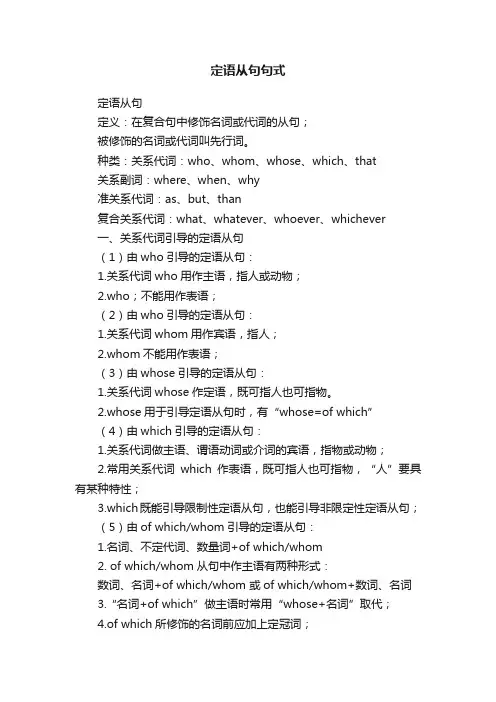
定语从句句式定语从句定义:在复合句中修饰名词或代词的从句;被修饰的名词或代词叫先行词。
种类:关系代词:who、whom、whose、which、that关系副词:where、when、why准关系代词:as、but、than复合关系代词:what、whatever、whoever、whichever一、关系代词引导的定语从句(1)由who引导的定语从句:1.关系代词who用作主语,指人或动物;2.who;不能用作表语;(2)由who引导的定语从句:1.关系代词whom用作宾语,指人;2.whom不能用作表语;(3)由whose引导的定语从句:1.关系代词whose作定语,既可指人也可指物。
2.whose用于引导定语从句时,有“whose=of which”(4)由which引导的定语从句:1.关系代词做主语、谓语动词或介词的宾语,指物或动物;2.常用关系代词which作表语,既可指人也可指物,“人”要具有某种特性;3.which既能引导限制性定语从句,也能引导非限定性定语从句;(5)由of which/whom引导的定语从句:1.名词、不定代词、数量词+of which/whom2. of which/whom从句中作主语有两种形式:数词、名词+of which/whom 或of which/whom+数词、名词3.“名词+of which”做主语时常用“whose+名词”取代;4.of which所修饰的名词前应加上定冠词;(6)由介词+which+抽象名词引导的定语从句:1.在非限制性定语从句中,以“介词+which+抽象名词”结构补充说明,which作定语;2.the way后接定语有三种形式:不加;加that;加in which;(7)由that引导的定语从句:1.关系代词that在从句中作主语或宾语,不作介词宾语,既指人也指物;2.先行词是不定代词时,必须用that引导定语从句;3.先行词被不定代词修饰时,必须用that引导定语从句;4.先行词被序数词或形容词最高级修饰时,必须用that引导定语从句;5. 先行词既有人又有物时,必须用that引导定语从句;6. 先行词被the only、the same、the last修饰时,必须用that 引导定语从句;7.以who、which引起的问句中,为避免重复,常用that引导定语从句;8.用作关系副词以修饰表示时间的名词时,常用that代替when 引导定语从句;9.构成非限制性定语从句时,不用that;10关系代词前有介词且指物时,不用that;11.先行词本身是that时,不用that;12.关系代词之后有插入成分时,不用that;二、关系副词引导的定语从句(1)由when的定语从句:1.关系副词when是兼有连词作用的副词,常用于表示时间;2.先行词为表示时间的名词;3在口语中,先行词为表示时间的名词时,可以省略when;4先行词在从句中起副词作用作时间状语时,用when引导定语从句;先行词在从句中起代词作用作宾语时,用which/that引导定语从5.在this/that/it’s后可省略先行词the time;6.现代英语口语中,the day when、the time when、the moment when可用that代替;;7.关系副词when可用恰当的“介词+which”代替;(2)由where引导的定语从句:1. 关系副词where是兼有连词作用的副词,常用于表示地点;2.先行词为表地点或有地点含义的抽象名词;3.在口语中,先行词是place、room等词时,可以省略where;4.先行词在从句中起副词作用作地点状语时,用where引导定语从句;先行词在从句中起代词作用作宾语时,用that/which引导定语从句;5. 在this/that/it’s后可省略先行词the place;6. 现代英语口语中,the place where可用the place that代替;7. 关系副词where可用恰当的“介词+which”代替;(3)由why引导的定语从句:1. 关系副词why兼有连词作用的副词,常用于表示原因;2.先行词只有reason;3.在口语中,可以省略why;4.先行词reason在从句中起副词作用表原因时,用why引导定语从句;先行词reason在从句中起代词作用作宾语时,用that/which引导定语从句;5.在this/that/it’s后可省略先行词the reason;6.现代英语口语中,the reason why可用the reason that代替;7. 关系副词why可用恰当的“介词+which”代替;(4)由介词+where/when引导的定语从句:1.from where引导的定语从句中,where代表主句提供的地点;2.since/by when引导的定语从句中,when代表主句提供的时间三、准关系代词引导的定语从句(1)由准关系代词as引导的限制性定语从句:1.as既可作引导状语从句的连词,也可作引导定语从句的关系代词;2.在such…as引导的定语从句中,as在从句中作主语或表语;3.在the same…as引导的定语从句中,as在从句中作主语或宾语;4.在as…as引导的定语从句中,as在从句中作主语;5.区别:such…as引导定语从句,such…that引导结果状语从句;6.区别:the same…as指两物相似,the same…that描述的是同一物;(2)由准关系代词as引导的非限制性定语从句:1.as代表主句或主句一部分的意思,不能指代某个名词或代词;2.在as引导的非限制性定语从句中,as可以放在主句的任意位置,在从句中作主语或宾语;3.主句表否定,as引导的定语从句位于主句之后时,as指代的主句不表否定,可用but代替;4.主句表否定,as引导的定语从句位于主句之前时,as指代的主句仍表否定意义;5非限制性定语从句中,which引导的从句不能放在主句前,as 引导的从句可放在主句前后.;6.非限制性定语从句中,as/which用作关系代词时都可指代一个句子,但as有“就像”之意;7.非限制性定语从句中,当从句的谓语动词时be动词或连系动词时,as/which都可作主语;8.非限制性定语从句中,当从句的谓语动词是行为动词时,只能用which作主语;9.非限制性定语从句中,as可作连词引导状语从句,构成“as+过去分词”形式,表定语义;(3)由准关系代词but引导的定语从句:1.but本身含有否定义,相当于who/which/that…not;2.but的先行词往往是有否定义的代词或名词词组,通过双重否定表强烈肯定;3.but用于定语从句中作主语,此时谓语动词的数要与先行词一致,时态要与主句一致;4.but用于引导状语从句时,有“but=that...not”(4)由准关系代词than引导的定语从句:1.than引导的定语从句中,谓语动词的数和时态必须与被比较级修饰的先行词一致;2.than引导的状语从句中,用作连词的than可兼作关系代词在主句中作主语,than指代主句;3.than引导的状语从句中,构成“than+过去分词”结构,than 后省略了形式主语it、动词be;四、复合关系代词引导的定语从句(1)复合关系代词what引导的定语从句:1.定语从句中,what是由先行词和关系代词组成的复合词,是兼作先行词的关系代词;2.what用于指人时,what=the person that;what用于指物时,what=the thing(s) which;3.what在定语从句中起名词作用时,可作主语、宾语、表语;4.what在定语从句中起形容词作用时,修饰名词,意为“仅有的”;5.what在定语从句中起形容词作用时,常与few、little连用,意为“尽管不多,但已全部”;6.what引导的名词性从句中,无疑问义,可作从句的主语、宾语、介宾、宾补;7.what用于表比喻义的特殊结构:A is to B what C is to D;8.what组成的常用短语:What if…? 如果…怎么样?What of it?那又怎么样?(2)复合关系代词whoever,whomever,whichever,whatever引导的定语从句:1.whoever、whomever、whichever、whatever具有名词功能,引导名词性从句;2.whoever、whomever、whichever、whatever指代未知的人或物,在从句中作主语或宾语;3.whichever、whatever在名词性从句中兼起形容词作用,修饰从句中名词,意为“仅有的”;4. whoever、whichever、whatever在名词性从句中兼起副词作用,引导让步状语从句;五、关系代词的省略1.当关系代词在定语从句中作宾语时往往省略;2.当关系代词在定语从句中作表语时,用that且往往省略;3.当先行词为不定代词时,往往不用关系代词;4.当定语从句为there be句型时,往往不用关系代词;5.当主句为there be句型时,实际主语后若带有定语从句,作主语的关系代词有时省略;六、插入语(1)分句用作插入语:I believe、I find、I hear、I imagine、I remember、I think、I sup pose…(2)状语分句作插入语:1.可作插入语的状语分句有:as far as I know、as I told you before、if you like…2.省略形式的状语分句作插入语:if ever、if possible、if any…(3)what构成的惯用插入语:1.“what+be+比较级形容词”结构,意为“而且,尤有甚者“;2.“what we call,what is called”,意为“所谓的”;3.“what+…”的类似结构:what we consider、what you refer to as、what is referred to as…例句:This is the man who helped me.(who在从句中作主语)The doctor whom you are looking for is in the room.(whom 在从句中作宾语)Do you see the house whose windows are all broken?(whose在从句中作定语)The building which stands near the river is our school.(which在从句中作主语)This is the book (which) you want.(which在从句中作谓语动词的宾语)The room in which there is a machine is a workshop.(which 在从句中作介宾)The war killed 1000 people, most of which were very young.(“不定代词+of which”的形式)The committee consists of 20 members, five of whom are women.(“数量词+of whom”的形式)Do you see the house the windows of which are all broken?(“名词+of which”作主语结构之一)Do you see the house of which the windows are all broken? (“名词+of which”作主语结构之二)It rained all night, during which time the ship broke in pieces.(“介词+which+抽象名词”结构)That’s the way (/) he spoke.(the way后接定语的形式之一)That’s the way that he did it. (the way后接定语的形式之二) That’s the way in which you answered the question. (the way后接定语的形式之三)。
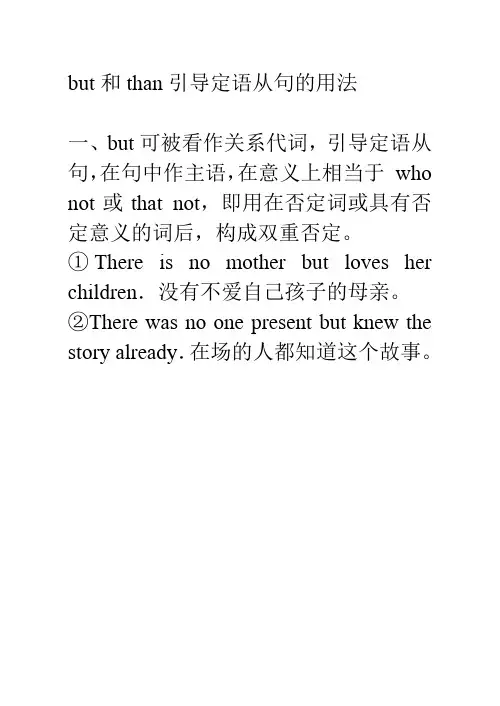
but和than引导定语从句的用法一、but可被看作关系代词,引导定语从句,在句中作主语,在意义上相当于who not或that not,即用在否定词或具有否定意义的词后,构成双重否定。
①There is no mother but loves her children.没有不爱自己孩子的母亲。
②There was no one present but knew the story already.在场的人都知道这个故事。
二、than作关系代词时,一般用在形式为比较级的复合句中,其结构为形容词比较级(more)...than+从句,than在从句中作主语,相当于that,代表它前面的先行词。
这时,它兼有连词和代词的性质①The indoor swimming pool seems to bea great deal more luxurious than is necessary.室内游泳池过于豪华。
②He got more money than was wanted.他得到了更多的钱。
运用上述知识翻译下列句子:1.任何人都喜欢被赞扬。
(but)2.我们大家都想去桂林。
(but)3.没有人不同情那些贫困的孩子。
(but)4.我们班上没有一个人不想帮你。
(but)5.这件事情比想象的要复杂。
(than)6.这个广告的效果比预想的要好。
(than)7.这个问题看起来容易,实际上很难。
(than)8.他爸妈给他的零用钱总是超过他的需要。
(than)答案:1.There is no one but likes to be praised.2.There is no one of us but wishes to visit Guilin.3.There is no man but feels pity for those poor children.4.There is no one in our class but wants to help you.5.This matter is more complex/ complicated than is imagined.6.This advertisement is more affective than is expected.7.The problem may be more difficult in nature than would appear.8.He got more pocket money from his parents than was demanded.5.无论多么荒凉,多么难以行走的地方,人们也能把它变成战场?(but)5.There is no country so wild and difficult but will be made a theatre of war.。
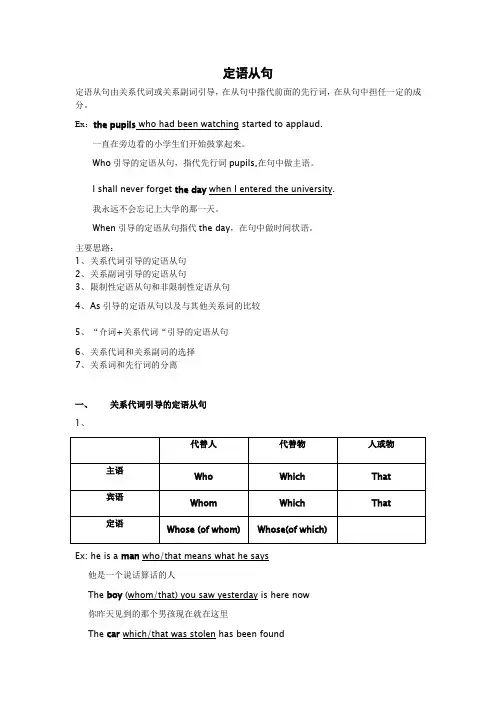
定语从句定语从句由关系代词或关系副词引导,在从句中指代前面的先行词,在从句中担任一定的成分。
Ex:the pupils who had been watching started to applaud.一直在旁边看的小学生们开始鼓掌起来。
Who引导的定语从句,指代先行词pupils,在句中做主语。
I shall never forget the day when I entered the university.我永远不会忘记上大学的那一天。
When引导的定语从句指代the day,在句中做时间状语。
主要思路:1、关系代词引导的定语从句2、关系副词引导的定语从句3、限制性定语从句和非限制性定语从句4、A s引导的定语从句以及与其他关系词的比较5、“介词+关系代词“引导的定语从句6、关系代词和关系副词的选择7、关系词和先行词的分离一、关系代词引导的定语从句1、Ex: he is a man who/that means what he says他是一个说话算话的人The boy (whom/that) you saw yesterday is here now你昨天见到的那个男孩现在就在这里The car which/that was stolen has been found偷走的车已经找到了2、使用关系代词应注意的问题○1、关系代词做介词的宾语,只能用whom,不用who,如果介词在句尾,都可以用。
Ex: This is the girl who/whom he worked withThis is the girl with whom he worked这就是和他一起工作的那个女孩。
○2、当whose代替物时,就相当于of which.Ex::the house whose window are broken is unoccupiedThe house of which window are broken is unoccupied窗子破了的那所房子没人住。
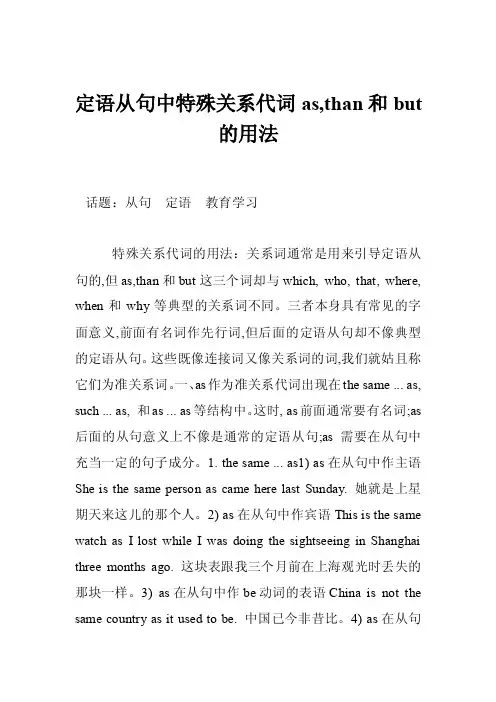
定语从句中特殊关系代词as,than和but的用法话题:从句定语教育学习特殊关系代词的用法:关系词通常是用来引导定语从句的,但as,than和but这三个词却与which, who, that, where, when和why等典型的关系词不同。
三者本身具有常见的字面意义,前面有名词作先行词,但后面的定语从句却不像典型的定语从句。
这些既像连接词又像关系词的词,我们就姑且称它们为准关系词。
一、as作为准关系代词出现在the same ... as, such ... as, 和as ... as等结构中。
这时, as前面通常要有名词;as 后面的从句意义上不像是通常的定语从句;as需要在从句中充当一定的句子成分。
1. the same ... as1) as在从句中作主语She is the same person as came here last Sunday. 她就是上星期天来这儿的那个人。
2) as在从句中作宾语This is the same watch as I lost while I was doing the sightseeing in Shanghai three months ago. 这块表跟我三个月前在上海观光时丢失的那块一样。
3) as在从句中作be动词的表语China is not the same country as it used to be. 中国已今非昔比。
4) as在从句中作行为方式状语You should learn to do housework in the same way as your mother does it. 你应该学会像你母亲那样做家务活。
2. such ... as1) as在从句中作主语Let children read such books as tend to make them better and brighter. 让孩子看那些容易让他们变得更好更聪明的书。
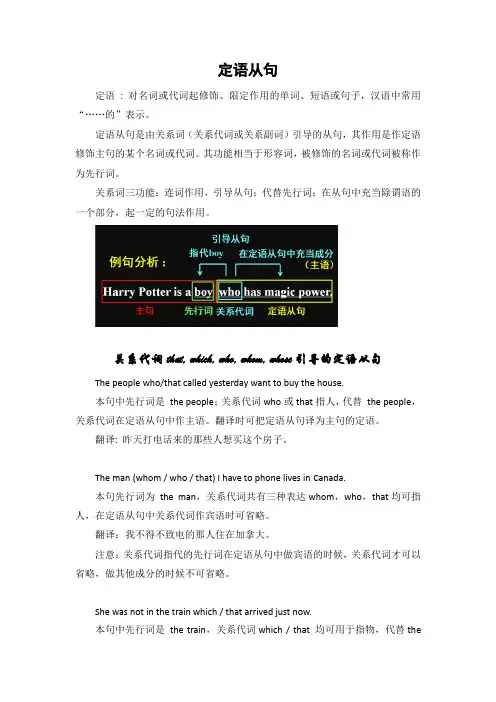
定语从句定语: 对名词或代词起修饰、限定作用的单词、短语或句子,汉语中常用“……的”表示。
定语从句是由关系词(关系代词或关系副词)引导的从句,其作用是作定语修饰主句的某个名词或代词。
其功能相当于形容词,被修饰的名词或代词被称作为先行词。
关系词三功能:连词作用,引导从句;代替先行词;在从句中充当除谓语的一个部分,起一定的句法作用。
关系代词that, which, who, whom, whose引导的定语从句The people who/that called yesterday want to buy the house.本句中先行词是the people;关系代词who或that指人,代替the people,关系代词在定语从句中作主语。
翻译时可把定语从句译为主句的定语。
翻译: 昨天打电话来的那些人想买这个房子。
The man (whom / who / that) I have to phone lives in Canada.本句先行词为the man,关系代词共有三种表达whom,who,that均可指人,在定语从句中关系代词作宾语时可省略。
翻译:我不得不致电的那人住在加拿大。
注意:关系代词指代的先行词在定语从句中做宾语的时候,关系代词才可以省略,做其他成分的时候不可省略。
She was not in the train which / that arrived just now.本句中先行词是the train,关系代词which / that 均可用于指物,代替thetrain,关系代词在定语从句中作主语。
翻译:她不在刚刚到的那列火车上。
This is the book (which / that) you wanted.本句中先行词为the book,关系代词that / which指物,代替the book,关系代词在定语从句中作宾语,可省略。
翻译:这就是你想要的那本书。
I live next door to a couple whose children often make a lot of noise.We live in a house whose window opens to the south.whose既可以指人,也可以指物。
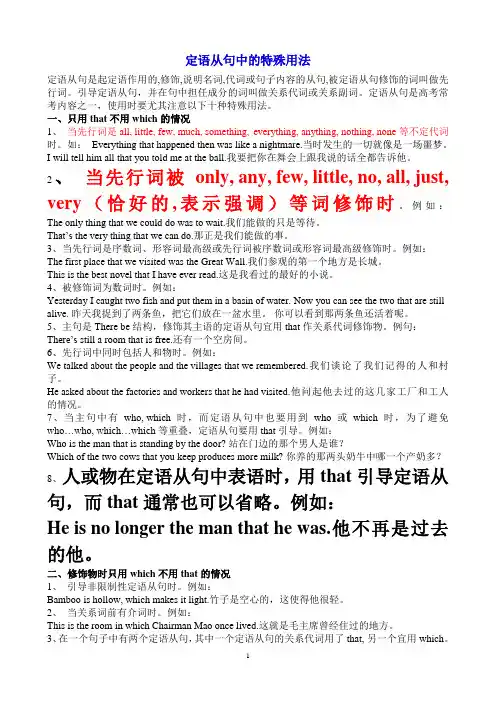
定语从句中的特殊用法定语从句是起定语作用的,修饰,说明名词,代词或句子内容的从句,被定语从句修饰的词叫做先行词。
引导定语从句,并在句中担任成分的词叫做关系代词或关系副词。
定语从句是高考常考内容之一,使用时要尤其注意以下十种特殊用法。
一、只用that不用which的情况1、当先行词是all, little, few, much, something, everything, anything, nothing, none等不定代词时。
如:Everything that happened then was like a nightmare.当时发生的一切就像是一场噩梦。
I will tell him all that you told me at the ball.我要把你在舞会上跟我说的话全都告诉他。
2、当先行词被only, any, few, little, no, all, just, very(恰好的,表示强调)等词修饰时。
例如:The only thing that we could do was to wait.我们能做的只是等待。
That’s the very thing that we can do.那正是我们能做的事。
3、当先行词是序数词、形容词最高级或先行词被序数词或形容词最高级修饰时。
例如:The first place that we visited was the Great Wall.我们参观的第一个地方是长城。
This is the best novel that I have ever read.这是我看过的最好的小说。
4、被修饰词为数词时。
例如:Yesterday I caught two fish and put them in a basin of water. Now you can see the two that are still alive. 昨天我捉到了两条鱼,把它们放在一盆水里。
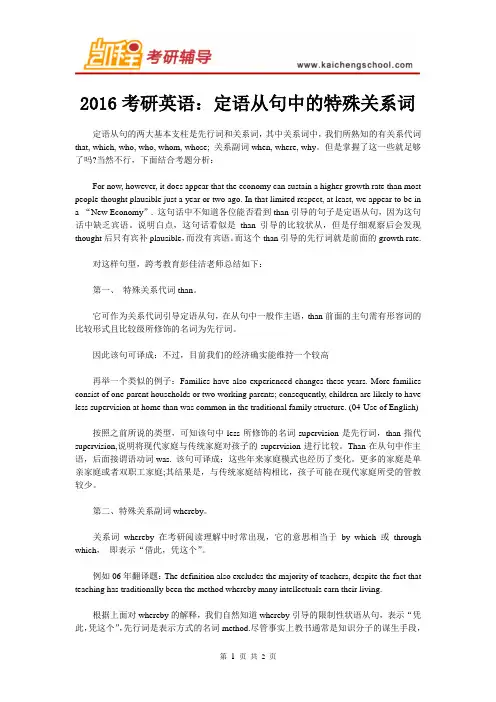
2016考研英语:定语从句中的特殊关系词定语从句的两大基本支柱是先行词和关系词,其中关系词中,我们所熟知的有关系代词that, which, who, who, whom, whose; 关系副词when, where, why。
但是掌握了这一些就足够了吗?当然不行,下面结合考题分析:For now, however, it does appear that the economy can sustain a higher growth rate than most people thought plausible just a year or two ago. In that limited respect, at least, we appear to be in a “New Economy”. 这句话中不知道各位能否看到than引导的句子是定语从句,因为这句话中缺乏宾语。
说明白点,这句话看似是than引导的比较状从,但是仔细观察后会发现thought后只有宾补plausible,而没有宾语。
而这个than引导的先行词就是前面的growth rate.对这样句型,跨考教育彭佳洁老师总结如下:第一、特殊关系代词than。
它可作为关系代词引导定语从句,在从句中一般作主语,than前面的主句需有形容词的比较形式且比较级所修饰的名词为先行词。
因此该句可译成:不过,目前我们的经济确实能维持一个较高再举一个类似的例子:Families have also experienced changes these years. More families consist of one-parent households or two working parents; consequently, children are likely to have less supervision at home than was common in the traditional family structure. (04-Use of English)按照之前所说的类型,可知该句中less所修饰的名词supervision是先行词,than指代supervision,说明将现代家庭与传统家庭对孩子的supervision进行比较。
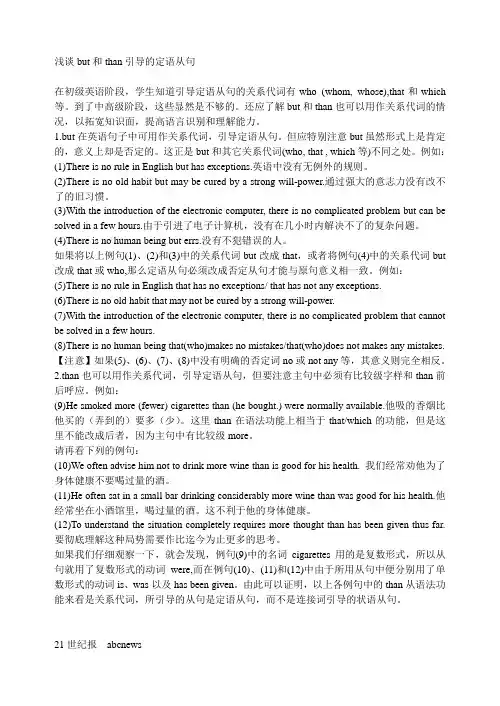
浅谈but和than引导的定语从句在初级英语阶段,学生知道引导定语从句的关系代词有who (whom, whose),that和which 等。
到了中高级阶段,这些显然是不够的。
还应了解but和than也可以用作关系代词的情况,以拓宽知识面,提高语言识别和理解能力。
1.but在英语句子中可用作关系代词,引导定语从句。
但应特别注意but虽然形式上是肯定的,意义上却是否定的。
这正是but和其它关系代词(who, that , which等)不同之处。
例如:(1)There is no rule in English but has exceptions.英语中没有无例外的规则。
(2)There is no old habit but may be cured by a strong will-power.通过强大的意志力没有改不了的旧习惯。
(3)With the introduction of the electronic computer, there is no complicated problem but can be solved in a few hours.由于引进了电子计算机,没有在几小时内解决不了的复杂问题。
(4)There is no human being but errs.没有不犯错误的人。
如果将以上例句(1)、(2)和(3)中的关系代词but改成that,或者将例句(4)中的关系代词but 改成that或who,那么定语从句必须改成否定从句才能与原句意义相一致。
例如:(5)There is no rule in English that has no exceptions/ that has not any exceptions.(6)There is no old habit that may not be cured by a strong will-power.(7)With the introduction of the electronic computer, there is no complicated problem that cannot be solved in a few hours.(8)There is no human being that(who)makes no mistakes/that(who)does not makes any mistakes. 【注意】如果(5)、(6)、(7)、(8)中没有明确的否定词no或not any等,其意义则完全相反。
but 引导的定语从句But引导的定语从句在英语语法中是非常重要的部分。
这种从句通常用来对前面的说法进行一个转折或者对比的描述。
在这篇文章中,我们将讨论But引导的定语从句的用法,结构和例句,以及如何正确使用这种从句。
一、But引导的定语从句的用法But引导的定语从句的主要用途是对前面的句子进行一个转折或对比的描述。
这种从句描述的内容通常与前一个句子形成一个对比,前一个句子表达了一种想法或情感,而后一个句子则给出了相反的想法或情感。
这种结构可以用来加强语气,使描述更加生动。
二、But引导的定语从句的结构But引导的定语从句由一个主句和一个从句组成。
在从句中,But引导了一个转折或对比的描述。
通常情况下,But引导的从句可以出现在一个句子的任何位置,这取决于你想要强调的内容。
关于从句的结构,我们需要注意以下几点:1. 从句通常以一个主语和一个动词开头2. 从句中的主语和前一个句子的主语可以不同3. 从句中的动词通常是一个不定式或一个动名词三、But引导的定语从句的例句1. She is a talented writer, but her latest book was a disappointment to many fans.2. They were poor, but they were happy.3. The weather in New York can be unpredictable, but that's part of what makes living here exciting.4. I love eating ice cream, but I always feel guilty afterwards.5. He is a great athlete, but he lacks the discipline needed to be truly great.四、如何正确使用But引导的定语从句了解But引导的定语从句的用法和结构很重要,但更重要的是,在使用这种语言结构时应遵循一些正确使用的准则。
浅谈but和than引导的定语从句在初级英语阶段,学生知道引导定语从句的关系代词有who (whom, whose),that和which等。
到了中高级阶段,这些显然是不够的。
还应了解but和than也可以用作关系代词的情况,以拓宽知识面,提高语言识别和理解能力。
1.but在英语句子中可用作关系代词,引导定语从句。
但应特别注意but虽然形式上是肯定的,意义上却是否定的。
这正是but和其它关系代词(who, that , which等)不同之处。
例如:(1)There is no rule in English but has exceptions.英语中没有无例外的规则。
(2)There is no old habit but may be cured by a strong will-power.通过强大的意志力没有改不了的旧习惯。
(3)With the introduction of the electronic computer, there is no complicated problem but can be solved in a few hours.由于引进了电子计算机,没有在几小时内解决不了的复杂问题。
(4)There is no human being but errs.没有不犯错误的人。
如果将以上例句(1)、(2)和(3)中的关系代词but改成that,或者将例句(4)中的关系代词but 改成that或who,那么定语从句必须改成否定从句才能与原句意义相一致。
例如:(5)There is no rule in English that has no exceptions/ that has not any exceptions.(6)There is no old habit that may not be cured by a strong will-power.(7)With the introduction of the electronic computer, there is no complicated problem that cannot be solved in a few hours.(8)There is no human being that(who)makes no mistakes/that(who)does not makes any mistakes. 【注意】如果(5)、(6)、(7)、(8)中没有明确的否定词no或not any等,其意义则完全相反。
定语从句中that,as, but ,than定语从句中as, that1、as 作为关系代词,用于限制性从句中,只能用在such,same,as或so的后面;用于非限制性定语从句中,则代替整个主句位置,如:Such a tree as I planted is called fir. As many boys as come will be admitted.He did it in so special a way as excited me.As is reported, a foreign delegation will arrivehere on Sunday.【注意】 1、在such as后有时跟一些名词作为例子,而不是从句。
2、在such后有时也可用who,which,that,what引导从句,如:He is such a man that I never wantto know.3、the same as与the same that的区别:The same as表示表示与从句中的内容“相似”,the same that表示与从句中的内容是“同一”。
注意:当先行词由the same修饰时,偶尔也用that引导定语从句,但是和由as 所引导的定语从句意思不同She wore the same dress that she wore at Mary's wedding. 她穿着她在Mary婚礼上穿过的一条裙子。
She wore the same dress as her young sister wore.她穿着和她妹妹所穿的一样的裙子。
2、but 表“不”的意思,不太常用,表示“that/who/whom…not”的意思,引导限制性从句,常用在否定句中,如:There is no one but knows him. (= Everyone knows him.)3、than 作为关系代词,只和形容词、副词的比较级一起用,如:He has more books than is necessary. I stayed longer than is demanded by my boss.(【难点分析】(一)限制性定语从句只能用that 的几种情况1.当先行词是anything, everything, nothing, something , few, all, none, little, some 等代词时,或者是由every, any, all, some, no, little, few, much 等修饰时(1) Have you taken down everything that Mr. Li has said?(2) There seems to be nothing that seems impossible for him in the world.(3) All that can be done has been done.(4) There is little that I can do for you.【注意】 Any man that/who has a sense of duty won't do such a thing. That is all that I have to say.2. 当先行词被序数词修饰(1) The first place that they visited in London was the Big Ben.3. 当先行词被形容词最高级修饰时(1) This is the best film that I have seen.4. 当形容词被the very, the only修饰时(1) This is the very dictionary that I want to buy,(2) After the fire in his house, the old car is the only thing that he owned.当先行词指人时,偶尔也可以用who:(3) Wang Hua is the only person in our school who will attend the meeting/5. 当先行词前面有who, which等疑问代词时(1) Who is the man that is standing there?(2) Which is the T-shirt that fits me most?6. 当先行词既有人,也有动物或者物体时(1) Can you remember the scientist and his theory that we have learned?7、that常和以-ible和-able结尾的词一起用,如:There is no plan that is impossible. There is no road that is impassable.不能用that的几种情况:1、关系代词与它的动词若被隔开时,不能用that,而要用who,which等:I am ready to help any man who, in case he is in trouble, needs my help.2、在介词后面不可用that来代替物,可把介词放在从句的句末用that,也可省略:Here is the novel about which I told you. Here is the novel (that) I told you about.关系代词as和which 引导的定语从句as和which引导非限制性定语从句,有相同之处也有不同之处。
关系从句的用法及归纳因为某个交叉元素(shared element)而连接在一起的主从句称之为关系从句。
主句中的交叉成分称之为先行词,从句中的交叉成分称之为后行词。
如果先行词是名词,主从句结合后,从句成为交代先行词属性的词,符合定语的定义,所以这种从句称之为定语从句。
换言之,定语从句是关系从句的子集,是先行词为名词的关系从句。
本节将介绍几个较为特殊的关系从句引导词。
1.Than引导的关系从句例1:We often advise him not to drink more wine than is good for his health.我们经常劝他不要喝过量的酒。
than引导的关系从句的拆分有一定难度:(1) That amount of wine is good for his health.(2) We often advise him not to drink more than that amount of wine.合并以后,than起连词作用,从句主语被省略了。
此时先行词是名词性词组that amount of wine,从句修饰它,所以仍然可以视作限定性定语从句。
2.But引导的限定性从句But除了做并列句的连词,表转折,还可以连接关系从句,相当于that…not或who…not。
There is no rule buthas exception.凡规则都有例外。
(没有不例外的规则。
)3.句型It(This) is/was the first(second,third……) time that sb have/had done sth.It(This) is/was the first (second, third……)time that sb have/had done sth.句型的本质是先行词为副词的关系从句。
例1.It is the first time that Mr. Smooth has visited China.拆分:(1) Mr. Smooth hasnever visited China before.(2) This is the first time.组合以后,去掉never…before,加上连接词that:It is the first time that Mr. Smooth has visited China.。
特殊引导词引导的定语从句特殊疑问词引导的定
语从句
1.but既可指人,也可指物,常在定语从句中充当主语。
but本
身含"否定"的意思,其作用相当于"that/which/who...not"。
它
前面的主句通常有"否定"的词(如:no,not,little,few,
hardly等)。
but引导的肯定定语从句和否定的主句连用,达到强
烈肯定的修饰效果。
eg.Thereisnomotherbutlovesherownchildren.没有不爱孩子的母亲。
2.as既可指人,也可指物,常在限制性定语从句中充当主、宾、表语。
as引导的定语从句的先行词前面常有as/such/thesame等修
饰词。
eg.Heisasbraveamanaseverlived.他是世界上最勇敢的人。
Thegirlisaslovelyarabbitaslivesinforest.这个姑娘就像一个生活在森林的小兔子一样可爱。
3.than既可指人,也可指物,可作关系代词来引导定语从句。
than前通常有表比较的词。
eg.Fewerfriendsthanwehadexpectedcametooureveningparty.
来参加晚会的朋友比我们预料的还要少。
but和than引导的定语从句
由于长期模式化的学习,很多学习者对于定语从句的引导词就有了一种定势的理解,所以无法理解but和than可以充当定语从句中的关系词。
作为特殊的关系代词,but和than 在定语从句中也是充当主语或宾语。
But引导的定语从句相当于一个否定的结构
who/which/that...not,表示某某人或事物不....;than引导的定语从句必须出现在比较级中,同时意义上保留“比”的意思。
but引导的定语从句
前文已经说过but引导定语从句时的功能及其含义,以下有两个例句,在翻译时一定要注意将but翻译成who/that/which...not
例1:Don’t be confined by rules. There is no rules but have exceptions.
不要让规则限制了你,没有规则没有例外。
注释:此时but在从句中充当主语,从句相当于there is no rules which/that do not have exceptions。
例2:There is no man but admires her generosity and kind heart.
没有人不赞赏她的慷慨和好心。
注释:此时but在从句中充当主语,相当于there is no man who does not admire her generosity and kind heart。
than 引导的定语从句
than引导定语从句一定出现在比较级当中,所以在理解上也要将than的意义放进去。
例1:Children today are likely to have less supervision at home than was common in the traditional family structure. (此时than在句中充当主语)
与传统家庭结构相比,现代家庭结构中的孩子受到的管教表少了。
例2:He soon found it easy to make more money by thieving than his father had done by a lifetime of honest work. (than在句中充当done(made)的宾语)
很快他就发现,通过盗窃所得的钱要比他爸爸一辈子辛勤劳动挣来的钱多得多。
结语:对于but和than引导的定语从句,很多同学感觉难以理解,也很难从根本上去领悟。
所以,在学习的时候,大家不要生搬硬套过去的语法规则,而是要从心里去接受这一新的语法知识,并且在见到相应句子时适当积累,逐步地达到内化的效果。